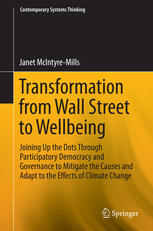

Most ebook files are in PDF format, so you can easily read them using various software such as Foxit Reader or directly on the Google Chrome browser.
Some ebook files are released by publishers in other formats such as .awz, .mobi, .epub, .fb2, etc. You may need to install specific software to read these formats on mobile/PC, such as Calibre.
Please read the tutorial at this link: https://ebookbell.com/faq
We offer FREE conversion to the popular formats you request; however, this may take some time. Therefore, right after payment, please email us, and we will try to provide the service as quickly as possible.
For some exceptional file formats or broken links (if any), please refrain from opening any disputes. Instead, email us first, and we will try to assist within a maximum of 6 hours.
EbookBell Team

4.8
74 reviewsTransformation from Wall Street to Well-being: Joining up the dots through Participatory democracy and governance to mitigate the causes and adapt to the effects of climate change addresses accountable leadership, supports collective interests, ethical governance and fairness to future generations in order to develop systemic approaches relevant to these issues. The humanistic focus, whilst central, addresses how we see ourselves in relation to the environment. It explores cultural perspectives in developed and developing parts of the world where people have a closer connection with the natural environment in comparison to those who live in cities. Furthermore the book discusses participatory action research to prefigure a means to hold the market to ensure that the use of resources that are necessary for the common good are accessible and equitable. The essential systemic aim this book offers is to balance human needs with nature. The research summarizes the discourses and the adaptive praxis in order to develop a bridge between cosmopolitan ethics and cosmopolitan governance. It does this in the interest of supporting and using cultural designs for living that support quality of life and spans five core domains as explained by the author. Overall, this monograph helps evaluates the extent to which the introduced approaches enable the community to consider their perceived assets and risks and the implications of their consumption choices.